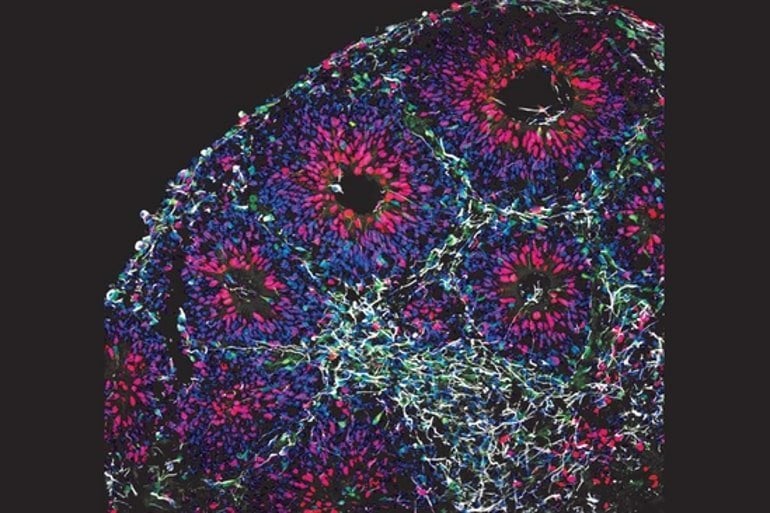Summary: A new brain organoid study reveals how alcohol exposure hinders the development and function of new brain cells. Fetal alcohol exposure impaired cortical functioning in the organoid model. Researchers say during pregnancy, no amount of alcohol is safe when it comes to healthy fetal development.
Source: UCSD
Alcohol consumption during pregnancy poses significant peril to the healthy development of the unborn child. There is no known safe amount of alcohol during pregnancy.
The consequences of prenatal alcohol exposure (PAE) are reflected in the different diagnoses that emerge under the umbrella of fetal alcohol spectrum disorders.
At one end of the spectrum, growth deficits and physical differences define fetal alcohol syndrome (FAS), but in most cases, irreversible brain damage leads to behavior and learning challenges even without a physical impact.
Experts estimate that 1.1 to 5 percent of U.S. schoolchildren — as many as 1 in 20 — may be affected by PAE, with some percentage experiencing FAS.
Although the clinical effects of fetal alcohol spectrum disorders are well documented, the precise molecular effects on the human fetal cerebral cortex are not fully understood.
In a new study, published November 16, 2022 in Molecular Psychiatry, researchers at University of California San Diego School of Medicine used human brain organoids to more specifically document how alcohol exposure impairs the development and functioning of new brain cells.
“The findings underscore the broad threat of alcohol exposure to the fetal brain. The harm inflicted is profound and extensive,” said Alysson R. Muotri, PhD, professor in the Departments of Pediatrics and Cellular and Molecular Medicine at UC San Diego School of Medicine.
Muotri is co-corresponding author of the study with Cleber A. Trujillo, a former project scientist in Muotri’s lab and now associate director of stem cell biology at Massachusetts-based Vesalius Therapeutics.
Using human induced pluripotent stem cells, Muotri and colleagues created three-dimensional brain organoids that develop similarly to human fetal corticogenesis — the formation of the outer layers of the brain that house many high-level functions, such as reasoning, conscious thought, emotional control and speech.

Alcohol exposure at different points of fetal brain development resulted in different but invariably negative effects, from fundamental dysfunction of cellular processes, to faulty construction of brain architecture and inadequate creation of support cells (gliogenesis) and connections between brain cells (synaptogenesis).
The researchers followed up by conducting electrophysiology recordings to monitor electrical activity patterns in the cortical organoids, documenting and confirming impaired cortical organoid function.
The authors said the findings improve upon previous studies using animal models.
“They overcome the suboptimal recapitulation of non-human models,” said co-author Miguel Del Campo, MD, PhD, associate professor at UC San Diego School of Medicine and medical geneticist at Rady Children’s Hospital-San Diego. “In fact, they show organoids are a valuable model for better assessing, more fully and deeply, the effects of alcohol exposure on the developing human brain.”
Co-author Kenneth L. Jones, MD, professor of pediatrics at UC San Diego School of Medicine, elaborated: “That is crucial because we can better see what prominent growth and signaling pathways are disrupted and perhaps discover new targets to therapeutically impede or prevent the neuropathology of prenatal alcohol exposure. The good news is that some of these alterations were reversed using specific experimental drugs.”
Co-authors include: Jason W. Adams, Priscilla D. Negraes, Justin Truong, Timothy Tran, Ryan Szeto, Carmen Teodorof and Stephen A. Spector, all at UC San Diego.
About this neuroscience research news
Author: Scott LaFee
Source: UCSD
Contact: Scott LaFee – UCSD
Image: The image is credited to UCSD
Original Research: Open access.
“Impact of alcohol exposure on neural development and network formation in human cortical organoids” by Alysson R. Muotri et al. Molecular Psychiatry
Abstract
Impact of alcohol exposure on neural development and network formation in human cortical organoids
Prenatal alcohol exposure is the foremost preventable etiology of intellectual disability and leads to a collection of diagnoses known as Fetal Alcohol Spectrum Disorders (FASD). Alcohol (EtOH) impacts diverse neural cell types and activity, but the precise functional pathophysiological effects on the human fetal cerebral cortex are unclear.
Here, we used human cortical organoids to study the effects of EtOH on neurogenesis and validated our findings in primary human fetal neurons. EtOH exposure produced temporally dependent cellular effects on proliferation, cell cycle, and apoptosis.
In addition, we identified EtOH-induced alterations in post-translational histone modifications and chromatin accessibility, leading to impairment of cAMP and calcium signaling, glutamatergic synaptic development, and astrocytic function. Proteomic spatial profiling of cortical organoids showed region-specific, EtOH-induced alterations linked to changes in cytoskeleton, gliogenesis, and impaired synaptogenesis.
Finally, multi-electrode array electrophysiology recordings confirmed the deleterious impact of EtOH on neural network formation and activity in cortical organoids, which was validated in primary human fetal tissues.
Our findings demonstrate progress in defining the human molecular and cellular phenotypic signatures of prenatal alcohol exposure on functional neurodevelopment, increasing our knowledge for potential therapeutic interventions targeting FASD symptoms.






